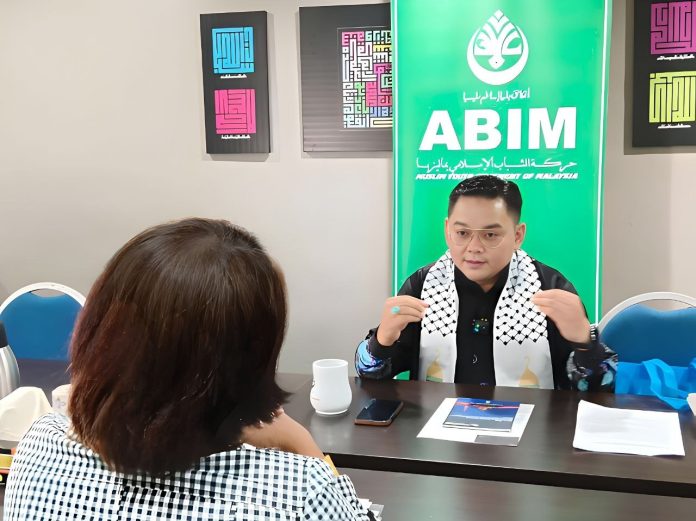Source- TNS News
KUALA LUMPUR: “The Malaysian Islamic Youth Movement (ABIM) will support the Madani economic narrative, a framework launched by Prime Minister Datuk Seri Anwar Ibrahim,” said its President Ahmad Fahmi Mohd Samsudin.
The Madani narrative, which means “civilizational” in Arabic, aims to achieve sustainable and inclusive growth that upholds the values of humanity and social will be one of ABIM’s main objective.
“The concept is not new to ABIM, as it reflects the philosophy and vision that the movement has been advocating for decades,“ he told TNS News in an Exclusive interview at the movement headquarters near here.
During the interview, Ahmad Fahmi disclosed about his plans and aspirations for the Muslim youth in Malaysia and beyond.
He also discussed the challenges and opportunities that he faces as the leader of one of the oldest and most influential Islamic organizations in the country.
ABIM, which was founded in 1971, is a movement that aims to promote Islamic values and principles among the Muslim youth, as well as to foster solidarity and cooperation with other faith-based communities.
Reflecting on 10 years of service and role in the global and regional Islamic networks.
Ahmad Fahmi, has been active in ABIM for more than 10 years, said that the movement has evolved from being a student activist group to a youth-based movement that engages in various social, educational, humanitarian and interfaith initiatives.
He also shared some of the achievements and projects that ABIM has been involved in, such as organizing interfaith dialogues, translating books, providing medical services, and collaborating with other international Islamic organisations.
ABIM is also a part of the World Assembly of Muslim Youth, a global network of Islamic educational groups that focuses on preserving the identity and overcoming the problems of Muslim youth.
Ahmad Fahmi is also an executive member of the Regional Islamic Da’wah Council of Southeast Asia and the Pacific (RISEAP), a non-governmental organisation that coordinates the Islamic missionary activities in the region.
Concurrently, Ahmad Fahmi, who is the CEO of Global Peace Mission Malaysia, an NGO that works on humanitarian and development projects.
The new leader said he would soon relinquish his position to focus fully on ABIM.
Since his appointment as ABIM president, Ahmad Fahmi received many messages and expectations from his friends and brothers, both locally and internationally.
“I think every past president and leader of ABIM has made their own contribution. But I can’t focus on two roles at once, so I need to choose one. ABIM oversees other agencies, like GPM, which is a separate entity with its own registration.”
Whilst being GPS CEO, and Ahmad Fahmi is ABIM’s vice president of International Affairs.
“That’s how we do humanitarian work abroad, and that’s why we’re involved in International Affairs,” he explained.
Challenges And Aspirations of the Muslim Youth
Touching on challenges that he and ABIM face, especially in the context of the changing definition and role of youth in Malaysia, Ahmad Fahmi said one of the issues that ABIM has to deal with is the amendment of the youth age, which was reduced from 40 to 30 by the government in 2019.
He said that while ABIM agrees with the age reduction, but hopes that the leadership of the youth movement will not be limited by the age factor, as there is a need for mentorship and guidance from the senior members.
“Muslim youth in Malaysia are facing various problems, such as unemployment, loan repayment, family issues, and lack of engagement.
“We want to be inclusive and provide a platform for the diverse and talented youth to showcase their skills and achievements, as well as to participate in the development of the society and the nation,” he said.
ABIM’s Global Humanitarian Vision: Advocating for Ummah and Malaysia’s Diplomatic Role
On the global front, Ahmad Fahmi expressed his concern and solidarity with the Muslim communities around the world who are experiencing difficulty and inequity, such as the Uyghurs, the Palestinians, the Kashmiris, the Rohingyas, and the Syrians.
He said that ABIM wants to be the voice of the Ummah, the global Muslim community, and to raise awareness and support for their causes.
ABIM has sent humanitarian aid to Gaza through the Ops Ihsan initiative, which is a collaborative effort between the Foreign Ministry and more than 50 NGOs.
“I have a vision of making Malaysia a “Central Arena” and a benchmark for the Islamic and humanitarian diplomacy, as well as a model of peaceful and harmonious coexistence among different faiths and cultures,” he said
He hopes to work with the government and other civil society groups to achieve this goal, and to prove that ABIM can do better for the society.
Ahmad Fahmi said that he is ready to take on the responsibility and the challenge, and to lead ABIM to a new level of excellence and service.
ABIM: No Formal Ties with World Uyghur Congress
When asked on a statement issued by the World Uyghur Congress (WUC) that labelled Hamas as a terrorist group, Ahmad Fahmi said: “ABIM does not agree with the statement made by (WUC), which condemned Hamas, the Palestinian resistance movement, and that the movement has made a clear and heavy statement to criticise WUC for its stance.”
Earlier in a statement, ABIM condemns WUC’s which it regards as defending the inhumane actions of the Zionist regime of Israel against the Palestinian people in Gaza in particular.
The youth movement pointed WUC statement contradicts the principles that are fought for on behalf of the Uyghur community that they want to represent.
It asserts that every oppression must be seen from the perspective of human rights, not wanting to please the political power of a certain world.
According to the Muslim youth leader, ABIM has been consistently supporting Hamas and the Palestinian cause since its establishment, and that it has been involved in various humanitarian initiatives, such as Ops Ihsan, which sent 50 tonnes of aid to Gaza.
He pointed ABIM’s support for the Uyghur cause is not based on any political agenda, but on the humanitarian and religious obligation to speak on behalf of the Muslim minority in China.
Ahmad Fahmi said that ABIM is not against China as a country or a nation, but only against its policies that violate the human rights and religious freedom of the Uyghurs.
The young leader said ABIM has engaged with the Chinese embassy and expressed its disagreement and criticism in a respectful manner.
“If people are asking us ABIM to withdraw or to cut any ties (with WUC), we don’t have any direct or we call formal engagement with this group. But we know the members and attends their programme,’’ he stressed.
He said that ABIM’s approach is to have engagement, not avoidance, and that it is the best platform to explain and understand the different perspectives and narratives on the Uyghur issue.
He also gave an example of how ABIM supports the South Africa initiative to file a case against Israel at the International Criminal Court (ICC), and that it is related to the Rome Statute, which Malaysia did not sign due to some public backlash.
He said that ABIM is not merely a humanitarian organisation, but also an advocacy and awareness organisation that promotes the preservation and flourishing of a rich, humanistic and diverse Uyghur culture, and supports the right of the Uyghur people to use peaceful, democratic means to determine their own political future.
ABIM: Platform for Youth Leaders from Different Political Parties Exchange Ideas
Ahmad Fahmi’s style is more on diplomacy, and he wants to create a platform where youth leaders from different political parties can exchange ideas putting aside political views and learn from the experiences of other countries.
He believes that this will help them to become better leaders for Malaysia, and to focus on the people’s needs rather than the party’s interests.
Ahmad Fahmi said he has been hosting events that bring together young leaders from different political groups. He arranged trips for them to see two contrasting countries: one ravaged by war and one that is a model of progress.
He gave an example of bringing a group to Turkey and Syria, where they visited some camps in Syria and saw the destruction caused by the war.
He said that he listened to the people of Syria and learned from their regrets. He said that he also learned from Turkey, which has many things to offer.
The charismatic youth leader said by having this platform, he can have a practical discussion with the youth leaders on what would be the best for Malaysia.
He said that he understands that Malaysia has been experiencing the leadership from various parties, and that what makes the winner is not the party, but the people.
Ahmad Fahmi said the leader must consider this crucial aspect and empower the people with information. He said the leader should not deceive the people, but enlighten them.
He also planned monthly sessions with experienced elders like Former Prime Minister Tun Dr. Mahathir Mohamad, and business people to network and gain insights from their wisdom.
Conclusion
In conclusion, Ahmad Fahmi is an insightful and diplomatic leader with numerous plans and aspirations aimed at empowering Muslim youth in Malaysia and extending his impact beyond the national borders.
He supports the Madani economic narrative, which aims to achieve sustainable and inclusive growth that upholds the values of humanity and social justice.
Ahmad Fahmi actively participates in a range of social, educational, humanitarian, and interfaith initiatives dedicated to advancing Islamic values and principles. Additionally, he advocates for solidarity and collaboration with other faith-based communities.
The Muslim youth leader expresses his concern and solidarity with the Muslim communities around the world who are enduring adversity and unfairness.
He also aims to make Malaysia a central arena and a benchmark for the Islamic and humanitarian diplomacy, as well as a model of peaceful and harmonious coexistence among different faiths and cultures.
Finally, he is prepared to shoulder the responsibility and embrace the challenge, aiming to elevate ABIM to a higher standard of excellence and service under his leadership.


